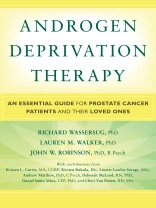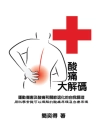‘This is an excellent resource for individuals who are both being treated by and caring for those on androgen deprivation therapy. It addresses commonly understood as well as sensitive topics impacted by this treatment and offers explanations and strategies for how to address and cope with these side effects. Its interactive activities, patient testimonials, and annotations encourage readers to study the topics so that they will better understand the issues. In all, it is a superb source of knowledge for these patients and their families and caregivers.’– Doody’s Book Review Service
Successfully manage the side effects of androgen deprivation therapy (ADT) and get back to life
For many men with prostate cancer, ADT (sometimes referred to as hormone therapy) offers hope for controlling the disease and living longer. But the side effects can leave you with unexpected physical and emotional changes. In Androgen Deprivation Therapy, experts who have helped hundreds of men provide you and your loved ones with the tools and solutions you need to prepare for treatment and deal with every situation. You’ll learn how to:
- Reduce hot flashes and night sweats
- Address changes in weight and body composition
- Maintain sexual intimacy despite changes in libido
- Fight fatigue and insomnia
- Control mood swings and depression
- Maintain open communication with your partner
Jadual kandungan
Foreword by Celestia (Tia) Higano, MD, Professor, Medical Oncology Division, University of Washington School of Medicine
Introduction
1. Androgen Deprivation Therapy
2. Physical Side Effects
3. Exercise
4. Healthy Eating
5. Effects on Psychological Well-being
6. Effects on Intimate Relationships and Sexuality
7. Impact on Committed Relationships
Conclusion : Staying Healthy
Appendix
PSA Chart
Drug Chart
Hot Flash Diary
Side Effect Self-Assessment
Action Plan
Pros/Cons
Goal Setting
Beliefs Awareness
Glossary
Resources
Mengenai Pengarang
Richard J. Wassersug, Ph D, is a research scientist who earned his doctoral degree in evolutionary biology from the University of Chicago in Illinois. He then spent most of his career studying the biology of amphibians and teaching anatomy in the medical school at Dalhousie University in Halifax, Nova Scotia. At the age of 52 years, he was diagnosed with prostate cancer and has received multiple treatments for the disease. After beginning androgen deprivation therapy, he redirected his research to study the psychology of androgen deprivation in various populations. Wassersug now holds the title of Honorary Professor at the University of British Columbia, Vancouver, Canada.












